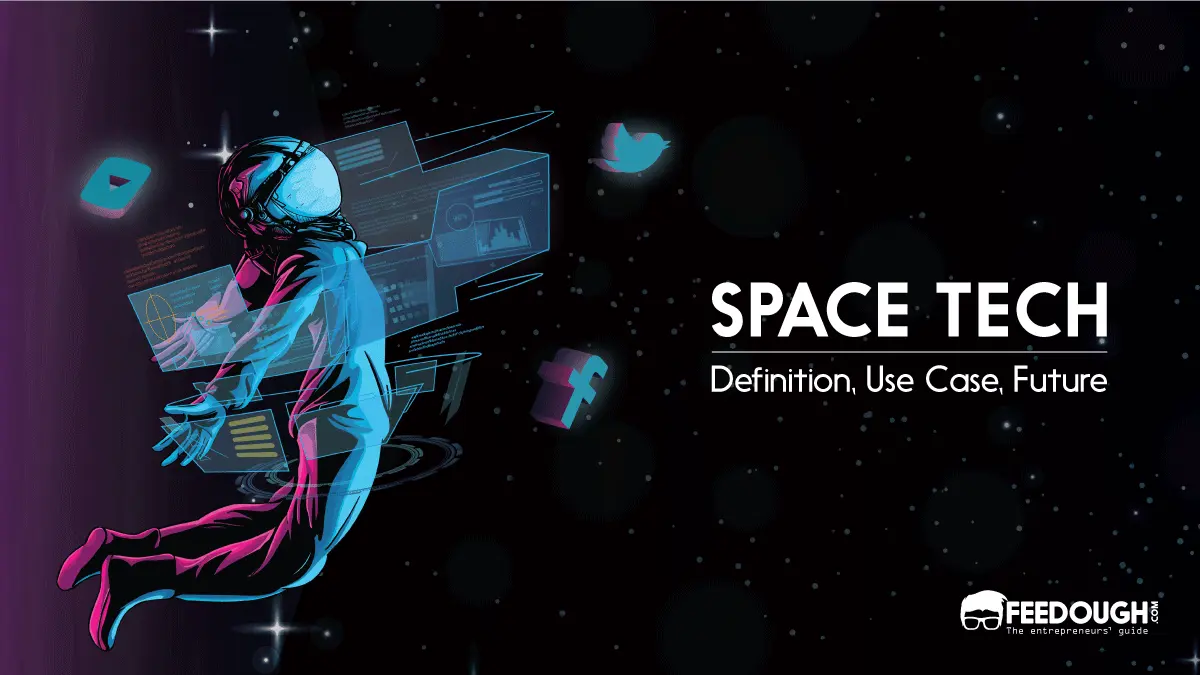We’re living in a space-age, and the stars are getting closer and closer. We’ve all been to the moon, and we’re about to visit Mars.
Space exploration is still in its infancy. So many things still need to be done to explore, discover and settle in outer space. But the first steps have already been taken – space tech is now a mainstream technology.
This is no longer a dream – it’s a reality.
What Is Space Tech?
Space technology or space tech refers to the application of engineering principles to the design, development, manufacture, and operation of devices and systems for space travel and exploration.
Space technology can be used to explore other planets, study the universe, and provide communication and navigation services to support human activities.
It encompasses everything from satellites and other instruments to the human aspects of space travel, such as astronautics, physics, chemistry, and biology.
Space tech also covers research and development of new technologies, new applications for existing technologies, and improvement of technologies for existing space systems.
Precisely, space tech is a wide-ranging term used to describe any technological advance or tool that is created specifically for use in outer space, whether it be for communication, navigation, exploration, or some other purpose.
Current Challenges In The Space Sector
The space industry is dynamic and ever-changing. It has many challenges, which are both technical and regulatory. The following are some of the challenges faced by the space industry.
- Technological Limitations: Space exploration has been a topic of interest for many countries in recent years. However, the technologies used in these missions are pretty costly and difficult to maintain. Moreover, space technology is highly complex as compared to the technologies used on Earth and has proven to be a challenge in terms of maintenance and usage.
- Lack of Funding: Space exploration is a risky business. Not only does it involve considerable amounts of money, but it also involves the risk of life if something goes wrong. It is very challenging to get funding for space exploration and is often met with criticism from certain people who argue that investing in space exploration is wasteful.
- Limited Knowledge: The space industry is an extremely complex industry which requires a large amount of technical expertise to develop. Only a handful of people have the expertise to create such technologies.
- High Failure Rate: The high failure rate of current space technology is another challenge facing the space industry. For example, satellites used to provide communication services are highly complex and are susceptible to faults and breakdowns due to natural and man-made causes.
- National and International Regulations: Governments regulate many aspects of space activities, including the launch of satellites, the use of space technologies, and access to outer space. Different space-related agencies also enforce these regulations. Besides this, there are also regulations relating to the use of space resources, spaceflight safety, and space debris.
- Lack Of Space Infrastructure: Space exploration requires a lot of things to be taken care of before a mission can be successfully carried out. Well-organized space infrastructure is needed to support space exploration. This includes things like transportation and storage, as well as the maintenance and operation of satellites. Without the right space infrastructure, space exploration is almost impossible.
- Less Initiative: The fact that there is not much initiative towards space exploration is another challenge the space industry faces. It has been argued that the lack of space industry initiatives is mainly due to people’s lack of interest. Moreover, it has also been argued that governments and other interested parties do not really understand the benefits of space exploration.
- Environmental factors: One of the challenges of space exploration is its impact on the environment. Space activities have a detrimental effect on the environment. For example, the use of high-powered rockets to launch satellites creates significant amounts of dust which pollutes the Earth’s atmosphere. Furthermore, space activities are also responsible for the creation of space debris which can cause severe damage to the Earth’s orbit.
- Risk factors: Many risk factors make space exploration a risky business. These include space-related risks such as orbital decay, space weather, radiation, and debris. Other risks include technical risks, such as failure and malfunctions, as well as political risks, such as conflict or environmental risks.
Space Tech Use Cases
Space technology has made lots of advancements in the last few decades. The use of space tech has changed many industries and also made life easier for us. Some of the important use cases are:
- Space Tourism: This is a new kind of tourism that involves people travelling to space for a few days or months. This is a recent trend as people have been getting more interested in space exploration. It is mainly popular with the rich because of the expense involved in going to space, as well as the fact that it is a very rare experience. Companies like Virgin Galactic and SpaceX are making plans to offer this kind of space tourism.
- Space Robotics: Robots are widely used today because of their ability to perform repetitive tasks, which are difficult for humans. Robots are used in many industries, including the medical industry, defence industry, manufacturing, etc. However, the most prominent use of robotics is in space exploration. A large number of space robots are sent into space to accomplish different tasks. These tasks include maintenance, construction, search and rescue, and science.
- Astronomy & Astrophysics: The use of space technology in astronomy and astrophysics has significantly improved our understanding of the universe. For example, the Hubble Space Telescope and the Chandra X-Ray Observatory are two great space telescopes that have made significant contributions to astronomy and astrophysics.
- Remote Sensing: Remote sensing is the collection of information from space about things on the Earth. It helps to measure physical parameters like temperature, elevation, wind speed, water, crop yields, pollution levels, forest fires, etc. These data are then used to monitor environmental conditions, monitor weather, and assess climate change. It is also useful in identifying problems in different parts of the world.
- Earth Science: Earth Science is the study of the physical properties of the Earth. Space tech has helped scientists identify mineral resources, find minerals and oil deposits, and even observe changes in the environment. The use of space technology in earth science has improved the quality of our knowledge of the Earth. For example, satellites can be used to measure land use and natural resources, estimate crop yields, study earthquakes, floods, drought, and more.
- Space Medicine: Space medicine refers to the medical aspects of space exploration. Many risks are associated with human space travel, including cosmic radiation, decompression sickness (DCS), microgravity, etc. Space medicine helps astronauts to mitigate these risks. For example, astronauts wear spacesuits that protect them from cosmic radiation, decompression sickness, and other space hazards. They also carry medicines to treat these hazards when they occur. Space medicine also makes it possible for them to perform surgeries in orbit or in deep space.
- Space Engineering: Space engineering is the science of designing, building, operating and maintaining space systems. It involves the development of space systems as well as their operation and maintenance. Space technology has helped develop many space systems like the Hubble Space Telescope, Chandra X-Ray Observatory, and many others.
- Space Architecture: Space architecture is the practice of planning, designing, constructing and using space structures. It includes the design and construction of spacecraft and other space structures like the International Space Station (ISS) and space habitats, as well as the design and construction of rockets, launch pads and other infrastructure.
- Space Mining: Space mining is the extraction of minerals, metals, and other materials from outer space. It is done through the use of spacecraft or by humans. For example, asteroids have been identified as being rich in water and other resources. The use of space technology in space mining has improved our ability to identify and extract these resources.
- Astrobiology: Astrobiology is the study of life in the universe. Astrobiology also helps us to understand the origin and evolution of life on Earth. It helps to study the relationship between the planets and their moons in the solar system. It also helps us to understand how life may have started on other planets.
- Planetary Geology: Planetary geology is the study of the physical processes that occur on the surfaces of planets and their moons. It involves studying these bodies’ composition, structure, and geological processes. It also involves understanding the impact of those processes on the environment.
- Satellite Communication: Satellites provide communication links for the world. They are used for many things like sending TV signals, tracking weather patterns, controlling nuclear weapons, etc. These satellites use radio waves, which are in the form of electromagnetic radiation. They are useful for wireless data transmission. They also enable global positioning systems (GPS), mobile phones, and other types of communications. They are also used for broadcasting television programs and radio programs.
- Spacecraft Propulsion: Spacecraft propulsion is the process by which a spacecraft is propelled through space. It can be done using any type of fuel. For example, spacecraft propulsion involves chemical reactions that release energy to push the spacecraft forward. It can also involve nuclear reactors that power spacecraft using nuclear fusion. The use of rocket engines has helped to propel spacecraft from Earth into space. Some spacecraft have been propelled by solar energy or by nuclear power. They can also be propelled by a combination of both.
- Satellite Manufacturing: Satellite manufacture is the process of making satellites. It includes designing the satellite, fabricating and assembling it, testing it, and integrating it.
- Aerial Imagery: Aerial imagery is the collection of images taken from above Earth by aircraft, balloons, or satellites. It provides a bird’s-eye view of places. It is used for many things like mapping the Earth’s surface, taking photos of land, and surveying the land.
- Space Farming: Space farming involves the growing of plants in space. It involves the use of various techniques and technologies to grow plants and food in space.
Spacetech Startups & Companies
Several companies have disrupted the space industry and created new markets. Here we will explore the top startups that have helped us separate space tech from regular technology.
SpaceX
SpaceX is a private company founded by Elon Musk, an American entrepreneur, inventor, engineer, and designer who is also a co-founder of PayPal and Tesla Motors. The company was founded in 2002 to develop advanced launch vehicles for commercial, military, and civil applications. The launch of SpaceX’s Falcon 1 rocket in June 2006 made it the first private company to launch a spacecraft into orbit successfully. After this successful launch, the company continued to launch its Dragon spacecraft, which made a successful test flight in May 2010, and a successful commercial cargo flight in March 2013. On 29 September 2015, SpaceX successfully launched its first reused Falcon 9 rocket with the first stage landing back at Cape Canaveral Air Force Station. In November 2016, SpaceX successfully launched the world’s most powerful rocket, the Falcon Heavy. The company plans to develop more powerful rockets.
RocketLab
Rocket Lab is a New Zealand-based company that offers microlaunch services and satellite launches for government and commercial clients. The company was founded in 2011 by Peter Beck and Jarrod Wight. Its main competitor is SpaceX. Rocket Lab uses small, expendable rockets called Electron vehicles to launch satellites into orbit.
Virgin Galactic
Virgin Galactic is a space tourism company founded by Richard Branson in 2004. The company provides commercial suborbital flights, including those for tourists. The company has achieved numerous successes and milestones since it was founded, including the first test flight of the SpaceShipTwo and the first commercial human space flight, which was carried out on 12 April 2013.
Future Of SpaceTech
We have been living on planet earth for quite a while, but there’s still so much space out there for us to explore, discover, and settle on. Our current generation, the next, and the one after that are going to live and work in space. We can’t do this without technological advances. The world is heading in this direction with the development of new technologies in space. Space is an infinite resource; there’s no reason why it should only be for the big players in the business. Smaller startups can make great contributions to the space industry and help us learn more about the universe.
The current space startups are not only helping us better understand the universe, but also contributing to research and development for future innovations. We will see new technologies in space in the coming years. We cannot predict exactly what they will be, but we can be sure that they will be innovative.
We might see more of robotics, AI, and ML in the short term as we see more satellites and other objects being launched into orbit.
Space tourism is another area where small startups can contribute significantly to developing the future of space travel. With a lot of smaller companies, we will see more private spaceflight, and we can expect to see space hotels in the near future.
It’s a fact that space tech will get more commercial in the long run, and more and more startups will get involved.
Go On, Tell Us What You Think!
Did we miss something? Come on! Tell us what you think about our article on what is space tech in the comments section.
A startup consultant, digital marketer, traveller, and philomath. Aashish has worked with over 20 startups and successfully helped them ideate, raise money, and succeed. When not working, he can be found hiking, camping, and stargazing.









